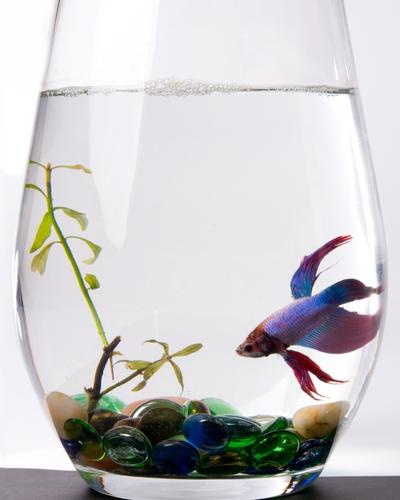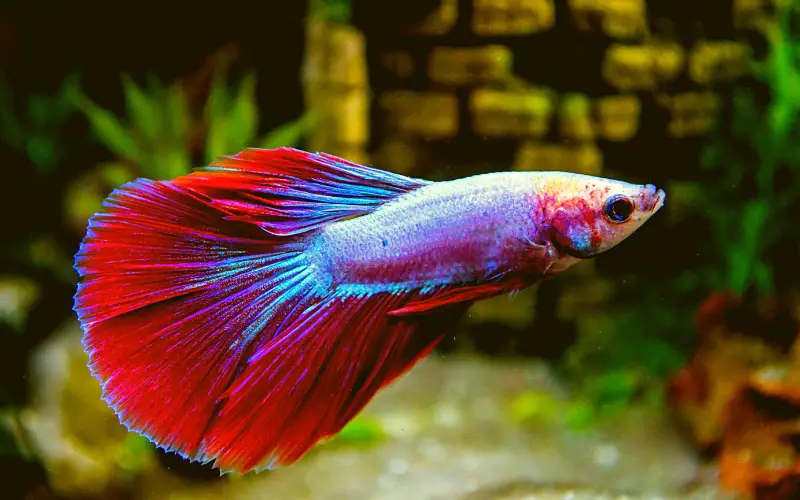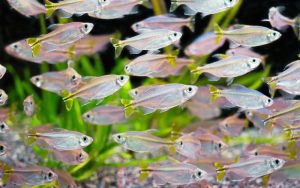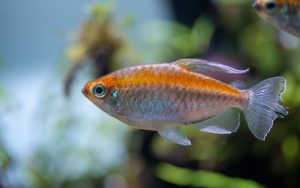It can be challenging to determine whether or not your betta fish is healthy. One common sign of a sick betta fish changing is its poop. So, how do betta fish poop, and what does betta fish poop look like?
You might be surprised that the answer is more complex than it initially seems. This blog post will explore what your healthy betta fish waste looks like and how often they need to ‘go.’
If you’re the proud parent of a pet fish, it’s natural to have questions about their behavior.
One of the most common questions we hear is: what does betta poop look like?
If you are unsure what healthy fish poop looks like, it can be difficult to determine when your tropical fish needs help.

Check out our guide to what betta fish poop looks like so you can quickly identify any digestive health concerns.
We will also offer tips on telling when your Betta needs a cleaning – put, many factors affect this peculiar critter’s bathroom habits!
Read on for an in-depth guide to understanding your pet’s toilet needs and preferences.
Table of Contents
ToggleDo Betta Fish Poop?
Yes, betta fish do poop. All animals produce waste; this is part of the natural cycle of life and death. Betta fish are no exception!
Your fish will usually release their waste as they eat or during a bowel movement – typically about once a day. Keep an eye out for symptoms that your Betta is straining or uncomfortable, and contact a veterinarian if you’re concerned.
Where Do Betta Fish Poop From?
Where do betta fish poop and pee? If you’ve ever wondered where do bettas poop from, the answer is their cloaca. This is an opening in the base of their tail and serves as both a reproductive and excretory organ. When your fish has to ‘go,’ waste will be released from this area.

Betta fish poop ball from a small opening right before the anal fin. The hanging poop is expelled with quite a bit of force, so it can often be seen flying through the water when a Betta poops. This can sometimes startle betta fish owners who aren’t expecting it!
Interestingly, Bettas seem to have a preferred place to poop. Many Bettas will repeatedly swim to one spot and release their bowels there.
No one knows why they do this, but it’s thought that perhaps they’re picking up some mineral or nutrient from the bottom of the tank that they need.
Can You See Betta Fish Poop?
what does fish poop look like? Betta fish poop consists of solid pieces and a cloudy liquid. The solid pieces are easy to spot; they will appear as dark, stringy bits and should be removed from the tank immediately.
Liquid waste is more difficult to detect, but you must also keep an eye on it. This cloudy liquid can cause ammonia levels to rise in your tank and can be dangerous for your fish.
Keeping an eye on the water quality of your Betta’s tank is essential for their health, so it’s important to know what you’re looking for when it comes to healthy betta poop.
If you find that betta fish’s poop has started accumulating in your tank, it’s time to do a water change and clean the gravel.
What Does Betta Fish Poop Look Like?
What does betta poop look like? Betta fish poop usually looks like small, round, brown, or tan pellets.
The size and shape of the pellets will vary depending on what the betta fish is eating, but they should be relatively small in size.
If you’re noticing a large increase in the size of your Betta’s poop, it might be a sign that something is wrong, and you should consult a veterinarian.
Does Fish Poop Float or Sink?
betta fish poop balls usually floats, so it’s easy to spot in the tank. If you do notice that your betta fish’s poop is sinking, it could be a sign of illness or poor water quality.
Make sure you’re regularly testing and maintaining the water quality in your tank, as this will help keep your fish healthy.
Betta fish poop is an integral part of maintaining your pet’s health. Knowing what to look for and how to keep a healthy tank will help ensure your Betta stays healthy and happy!
By understanding the signs of a healthy tank and recognizing when something isn’t quite right, you can rest assured that your Betta is getting the care they need.
It’s important to consider other factors affecting your pet fish’s toilet needs. These include their age, diet, and activity levels. Older fish regularly poop less often than younger ones, while active fish may require more.
How Long Does It Take Betta Fish to Poop?
How often do betta fish poop? Bettas usually poop within 24 hours. If your betta fish has not pooped for more than 24 hours, there might be a problem.
You can stimulate your Betta’s bowels by feeding him live food like a mosquito larva or bloodworm. You can also offer him some brine shrimp or boiled egg whites.
If that doesn’t work, you should take your Betta to the vet for a check-up.
To ensure your Betta stays healthy, feed them twice or three times a day at the optimal water temperature between 78-82F (26-28C).
Additionally, it’s essential to provide food with up-to-date nutritional content by looking for items opened in the last six months – this will ensure they get all of their vital nutrients!
It is essential to provide them with a nutrient-packed diet with an abundance of healthy fibers. , These dietary components help the digestive system move food through smoothly and ensure regular trips to the toilet!
How to Get Betta Fish to Poop?
Bettas are beautiful fish, but they can suffer from constipation. If your Betta is not poop regularly, he may be constipated. This problem can lead to health issues and a decreased lifespan for your fish.
This video will show you how to diagnose, avoid and solve betta fish constipation. The first step is to ensure you are feeding your high-quality betta food that is appropriate for its size.
You also want to provide them with various foods, as this can help stimulate their bowels. It would be best if you fed your Betta regularly and only gave them an amount they could eat within two minutes.
Finally, ensure that you regularly clean your Betta’s tank and perform water changes to maintain a healthy environment for them. This will help ensure that they get the proper amount of nutrition and maintenance levels of the tank they need.
What Color Is Betta Fish Poop?
What should Betta fish poop look like? Betta fish poop color will vary depending on the diet. Generally, it should be a small pellet that is brown or tan.
If you notice any discoloration in your Betta’s poop, it may be a sign of illness, and you should consult with a veterinarian as soon as possible.
Additionally, if your fish hasn’t pooped in more than 24 hours, it may be a sign of constipation, and you should take measures to get your Betta back on track.
In addition to diet, other factors can affect your fish’s toilet habits, such as age, activity level, and water quality. By taking the time to maintain their tank correctly and providing them with a healthy diet, you can keep your betta fish pooping looking normal.
Keeping an eye on your Betta’s poop will help ensure they remain healthy and happy!
Why Is My Betta Fish Pooping White?
Betta fish poop white stringy poop sometimes. This can be due to various reasons, such as parasites, stress, or poor water quality. If your Betta is pooping white strings, you should check your tank’s parameters and ensure they are within a safe range for fish.
It would help if you also took your fish to a veterinarian to rule out any potential illnesses. Finally, you should feed your Betta a variety of foods to help stimulate its bowels and keep them from becoming constipated.
Maintaining good hygiene in a betta’s environment is essential to prevent white poop and keep them healthy and happy.
How Do You Clean Betta Poop?
How to clean betta fish poop? Fish tanks can be a lot of work to keep clean, especially if you have a betta fish. Betta fish poop balls can easily be cleaned off the tank walls and substrate with a soft-bristled brush or vacuum.
Doing this regularly is essential, as uneaten food can rot and cause toxic levels in the water.
When cleaning your Betta’s tank, change out 25% of the water each week. You should also remove any uneaten food or waste from the tank as soon as possible.
Not only is it essential to clean your tank regularly, but you also need to know how to clean a betta fish tank correctly, or you could end up harming your fish.
This video shows you an easy way to clean a betta fish tank that is both effective and safe for your fish.
Do Betta Fish Pee?
Contrary to popular belief, betta fish do produce urine, but it is in tiny amounts. They make more waste than urine due to their high-protein diet.
This waste is typically in the form of poop which can be seen at the bottom of your tank or floating around in the water. It’s essential to monitor your tank and clean it regularly, as waste can build up and become toxic for your Betta.
If you notice an increase in the amount of urine or other changes in your Betta’s water, it could be a sign of sickness, and you should consult a veterinarian.
Why Is There Poop Hanging from My Betta Fish?
Why is there poop hanging from my fish? Betta fish poop hanging from the tail can signify several issues. It could be due to constipation, parasites, or poor water quality.
If your Betta is pooping strings, it may indicate that they are having trouble digesting its food or that its water has an imbalance of nutrients.
Check your tank’s parameters and ensure they are within a safe range for fish. It would help if you also took your fish to a veterinarian to rule out any potential illnesses.
Finally, you may want to feed your Betta a variety of foods to help stimulate its bowels, betta pooping regularly and keep them from becoming a constipated betta fish.
What Are Signs of a Stressed Betta Fish?
Signs of stress in a betta fish can vary depending on the cause, but some common symptoms include:
- Decreased appetite
- Increased aggression
- Loss of color or dulling of colors
- Hiding in corners or other dark areas
- Swimming erratically or upside down
- Pale gills
- Rapid breathing
- Clamped fins
If you notice any of these symptoms in your Betta, you should take steps to reduce their stress levels.
This could include frequent water changes, moving the tank to a quieter area, or providing more hiding places. If the symptoms persist, you should take your Betta to a veterinarian for further evaluation.
The health of your betta fish can depend on many factors, and it’s essential to be aware of any changes that could indicate an underlying issue.
Why Is My Betta Fish Poop Red?
The color of a bettas poop can vary depending on what the Betta is eating. If your Betta’s poop is red, it could be because the food you’re feeding him contains coloring that is being passed along in his stool.
Red food coloring is often used in commercial betta foods because it makes it more appealing to bettas. However, too much red fish food coloring can cause your Betta to have gastrointestinal problems, including diarrhea and constipation.
If your betta fish poop ball is consistently red, you may consider switching to a diet that doesn’t contain as much artificial coloring.
Alternatively, you can feed your Betta various foods to ensure that he gets a balanced diet.
If it’s better health for the fish you’re after, look no further than Prazipro! This potent medication is the go-to remedy for treating internal parasites like worms – a common issue among pet aquatic life.
That said, remember to be mindful of other factors that may contribute to poor health in fish, too: keep their environment clean and check out helpful tips from experts in caring for these beautiful creatures.
Regardless of the cause, if your bettas poop is red, you should take him to a veterinarian as soon as possible to rule out any potential illnesses.
How to Treat Betta Fish Constipation?
Many fish keepers think that they must be sick if their Betta isn’t eating. This is only sometimes the case – sometimes your Betta is just constipated!
This video tutorial shows you how to treat constipation in bettas using Epsom salt and water changes.
Constipation in betta fish can be caused by a variety of factors, such as stress or an unbalanced betta’s diet. To treat constipation, you should switch your Betta to a diet high in fiber and low in fat.
You should also provide them with plenty of live foods, such as brine shrimp, bloodworms, and black worms. You should also ensure your tank’s water parameters are within a safe range for fish.
Finally, you can give your betta peas or cucumber, as they both act as natural laxatives and can help relieve constipation.
Bloating is a common condition among fish, which can prevent them from swimming to depths or resulting in bobbing at the surface.
To avoid this issue, ensure proper feeding habits are established and maintained; moderation goes a long way towards preventing swim bladder disease, parasitic infection, and bacterial infection!
However, it’s important to make sure that the pieces of vegetables are small enough for your Betta to swallow without difficulty.
If constipation persists, you should take your Betta to a veterinarian for further evaluation. A vet can also check for any possible underlying illnesses that could be causing the issue.
With proper treatment and care, your Betta should make a full recovery and be back to its usual self in no time!
Conclusion
So, what does betta poop look like? Like any pet, it is crucial to understand what is typical for betta fish poop. This way, you can more easily tell when something is wrong and take appropriate action. With some knowledge about the subject, you can keep your betta fish healthy and happy for years to come! how does betta fish poop look like? If your betta fish is constipated, there are several things you can do at home to help relieve their discomfort. However, if the problem persists, it’s always best to consult a veterinarian specializing in fish care.
You might also like
- Betta Swim Bladder Disease: (7 Symptoms & Best Treatment)
- Betta fish pineconing Diseases (5 Symptoms & Best Treatment)
- How Many Betta Fish in a 10 Gallon Tank? (Beginner’s Guide)
- Can Betta Fish Live in a Bowl Without a Filter? (Solved)
- How to Fix Swim Bladder in Betta Fish? Signs, Causes & Best Cures
- Betta Clamped Fin: 3 Simple Steps to a Happy Fish
- Sick Betta Fish Signs Exposed: 7 Deadly Threats You Must Know!





